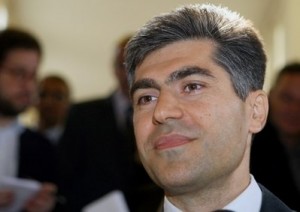 Iran on Saturday welcomed France’s refusal to extradite a detained Iranian to the United States where he is accused of buying electronic parts and exporting them illegally, news agencies reported.
Iran on Saturday welcomed France’s refusal to extradite a detained Iranian to the United States where he is accused of buying electronic parts and exporting them illegally, news agencies reported.
“His innocence was evident, (but) we still appreciate the French judiciary move in granting his freedom,” Iranian foreign ministry spokesman Ramin Mehmanparast said as engineer Majid Kakavand arrived back home.
“We consider it a positive point in Franco-Iranian relations,” he was quoted by the Mehr news agency as saying.
Majid Kakavand told reporters on arrival: “I consider it my right to lodge a complaint against US officials at the earliest time.”
Kakavand, who was arrested in March 2009, boarded an Iran Air flight from France on Friday, the official IRNA news agency had reported, after the US extradition request was turned down.
US officials accused Kakavand of buying electronic components and measuring instruments through a Malaysian company and exporting them to the Islamic republic via Malaysia between 2006 and 2008.
Washington argued that Kakavand had purchased sensitive dual-use technology that could be used for military purposes and violated export laws by failing to seek a special license to ship them to Iran.
Kakavand, 37, served as the director of a company in Malaysia, Evertop Services, that procured U.S. and European goods for export to Iran. Evertop’s main customers were two Iranian military entities, Iran Electronics Industry and Iran Communications Industries.
However, France does not have the same export requirements for Iran and the IEI company that received the orders came under a trading ban after Kakavand had already made his transactions, French officials said.
“What he was importing was dual use in the same sense that a switch or a cable can be dual use, but nothing more,” a French weapons expert Jean-Louis Barbier who reviewed the items for the defense told the New York Times. “If this is dual use, then everything else is.”
The decision to release Kakavand capped more than a year of legal wrangling in a case that had diplomatic implications as France pressed for the release of a French academic held in Tehran.
Kakavand’s case came before the courts as France sought the release of 24-year-old French academic Clotilde Reiss, who has been tried on charges of acting against Iranian national security.
President Mahmoud Ahmadinejad had linked Reiss’s release to the fate of Iranians held in French jails, but President Nicolas Sarkozy had flatly responded that there would be no such swap.
Another Iranian, Ali Vakili Rad, convicted of the 1991 murder of the deposed shah’s last prime minister, Shapour Bakhtiar, is in France awaiting a decision on a parole request.

Leave a Reply
You must be logged in to post a comment.